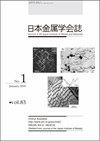Molecular Dynamics Study on Structural Relaxation Processes in Amorphous Germanium
IF 0.4
4区 材料科学
Q4 METALLURGY & METALLURGICAL ENGINEERING
引用次数: 2
Abstract
The structural relaxation of amorphous germanium was examined by molecular dynamics simulations based on the empirical Tersoff interatomic potential. Although the Tersoff potential overestimated both the melting and glass transition temperatures, it was able to reproduce the structural relaxation behavior. The potential energy decreases with thermal annealing below the glass transition temperature, but occasionally increases during structural relaxation. The mean square displacement of atoms also increases in these periods. These changes were attributed to cooperative atomic motion during the structural relaxation. Atomic trajectories revealed that structural changes are induced by spatiallyand temporally-inhomogeneous atomic motions: atomically mobile and immobile regions coexist during structural relaxation. [doi:10.2320/matertrans.M2017036]非晶锗结构弛豫过程的分子动力学研究
基于经验Tersoff原子间势的分子动力学模拟研究了非晶态锗的结构弛豫。虽然Tersoff势高估了熔融温度和玻璃化转变温度,但它能够再现结构弛豫行为。在玻璃化转变温度以下,势能随热退火而减小,但在结构弛豫过程中偶尔增大。原子的均方位移也在这些周期内增加。这些变化归因于结构弛豫过程中的协同原子运动。原子轨迹揭示了结构变化是由空间和时间上的非均匀原子运动引起的:在结构弛豫过程中,原子可动区和不动区共存。(doi: 10.2320 / matertrans.M2017036)
本文章由计算机程序翻译,如有差异,请以英文原文为准。
求助全文
约1分钟内获得全文
求助全文
来源期刊

Journal of The Japan Institute of Metals
工程技术-冶金工程
CiteScore
0.70
自引率
0.00%
发文量
27
审稿时长
6-12 weeks
期刊介绍:
Information not localized
 求助内容:
求助内容: 应助结果提醒方式:
应助结果提醒方式:


